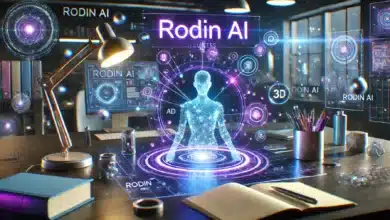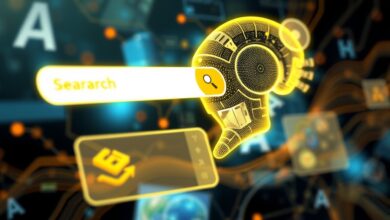Navigating the AI Frontier in Higher Education Business
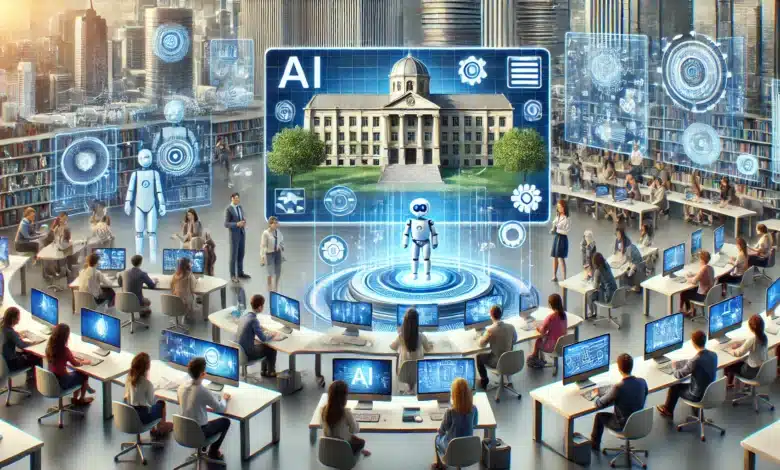
Artificial Intelligence (AI) is revolutionizing industries, and higher education is no exception. As universities and colleges adopt AI-driven solutions, they are reshaping how students learn, how educators teach, and how institutions operate. From personalized learning experiences to efficient administration, the possibilities are transformative. Let’s explore how AI in higher education is reshaping the landscape, the challenges it poses, and strategies for navigating this evolving frontier.
What is AI in Higher Education?
Artificial intelligence in education refers to the integration of advanced algorithms and machine learning models to enhance learning outcomes, streamline processes, and improve institutional efficiency. This includes tools for adaptive learning, AI-enhanced administrative systems, and intelligent tutoring systems. AI offers more than just automation—it fosters innovation, accessibility, and engagement.
For instance, Georgia State University employs predictive analytics to monitor over 800 risk factors for students, providing early interventions to reduce dropout rates. Similarly, Deakin University’s AI assistant, Genie, provides 24/7 study support, driving student satisfaction and engagement.
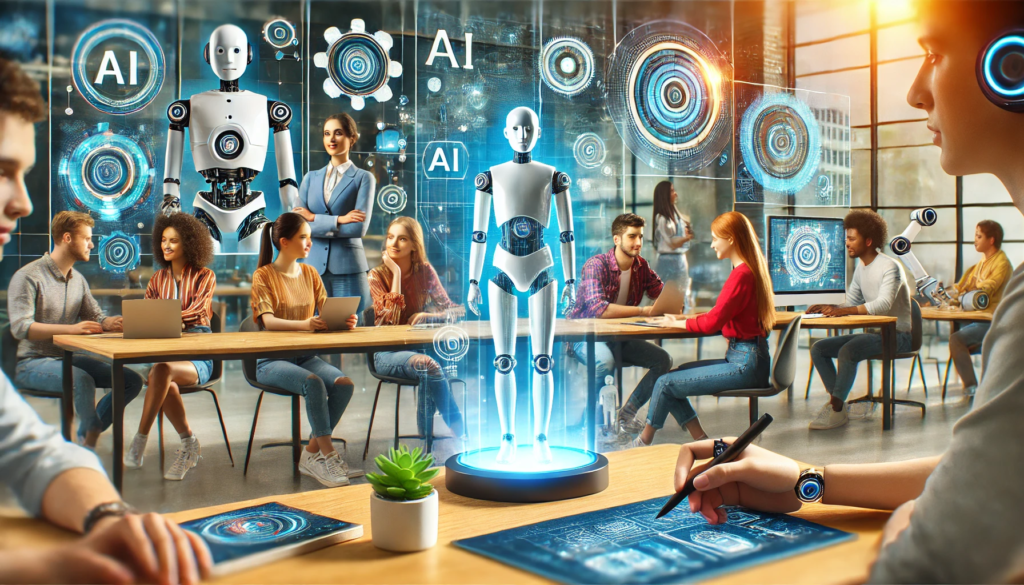
Benefits of AI in Higher Education
1. Personalized Learning Experiences
One of the most significant benefits of AI in higher education is the ability to tailor learning to individual students. AI-driven education solutions analyze student performance data to identify strengths and weaknesses, offering:
- Customized study plans
- Adaptive learning materials
- Real-time feedback
This approach transforms education into a dynamic and inclusive experience, addressing diverse learning needs.
2. Enhanced Administrative Efficiency
Administrative tasks often drain resources and time. With AI for educational management, institutions can automate processes like admissions, scheduling, and grading. AI-powered chatbots also provide:
- 24/7 student support
- Answers to routine queries
- Assistance with enrollment and financial aid
Streamlining these tasks allows faculty to focus more on teaching and student development.
3. Improved Student Engagement and Retention
AI fosters interactive learning environments with tools like virtual tutors and gamified platforms. These innovations:
- Adapt to individual learning paces
- Keep students engaged
- Help identify at-risk students using predictive analytics
Universities employing AI integration report increased retention rates, particularly among first-generation and underserved students.
4. Advanced Research Capabilities
AI accelerates research by processing large datasets, simulating experiments, and assisting with literature reviews. These advancements:
- Reduce the time required for research
- Enhance accuracy in data interpretation
- Enable researchers to focus on innovative projects
5. Accessibility and Inclusivity
AI makes education more accessible. For instance:
- Speech recognition tools assist hearing-impaired students.
- Text-to-speech applications help visually impaired learners.
- Language translation features support non-native speakers.
These technologies ensure that higher education reaches a broader audience.
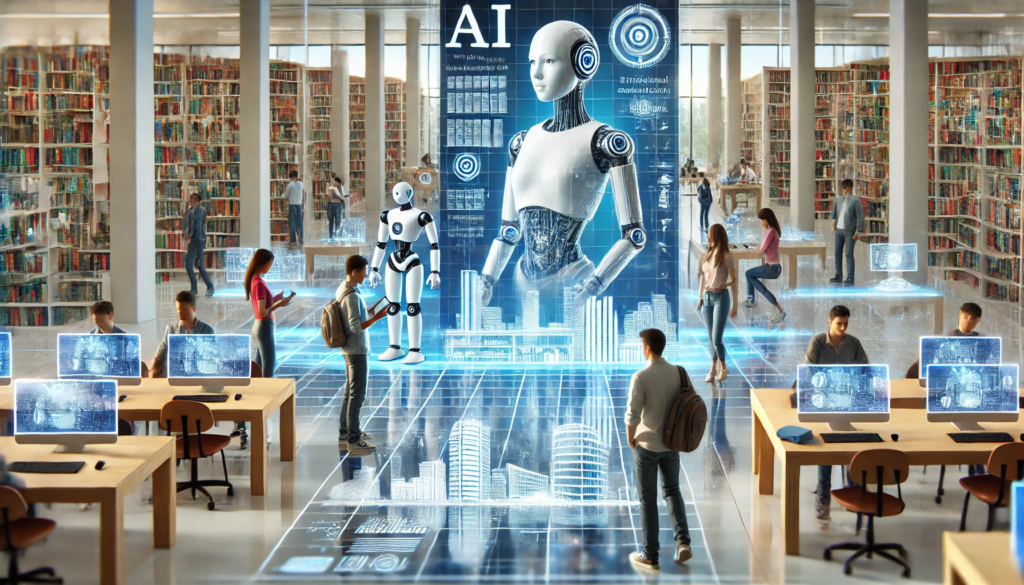
AI Applications in Learning and Teaching
AI-Powered Learning Experiences
Adaptive learning platforms like Coursera and Khan Academy use AI applications in learning to personalize content delivery. These platforms analyze user interactions to:
- Suggest targeted resources
- Provide tailored practice exercises
- Monitor progress effectively
Intelligent Tutoring Systems
AI tutoring systems leverage natural language processing (NLP) to answer student queries, clarify doubts, and recommend additional resources. They supplement classroom teaching by offering personalized assistance.
Smart Education Platforms
Platforms like Blackboard and Canvas incorporate AI-driven education solutions to simplify course management. These tools enable:
- Automated grading
- Performance Analytics
- Customizable learning paths
The Future of AI in Higher Education
Digital Transformation in Higher Education
AI is central to the digital transformation of universities. Future trends include:
- Virtual reality classrooms
- Immersive simulations for experiential learning
- AI-powered predictive analytics to forecast educational needs
AI-Driven Business Models in Education
Institutions are leveraging AI-driven business models in education to optimize operations. These models focus on cost efficiency, revenue generation, and scalability by adopting AI for tasks like resource allocation and alumni engagement.
Ethical Challenges of AI in Education
Despite its potential, AI poses ethical challenges:
- Data privacy concerns
- Algorithmic bias
- Transparency in decision-making
Educational institutions must prioritize fairness and accountability in AI systems to maintain trust.
Navigating Challenges: A Balanced Approach
Building an AI-Ready Culture
To harness AI effectively, universities must cultivate an AI-ready environment. This involves:
- Training faculty in AI technologies
- Encouraging interdisciplinary collaboration
- Offering workshops and seminars to familiarize students with AI tools
Focusing on Human-Centered Learning
AI should enhance, not replace, human interaction. Educators should use AI to provide more personalized support while ensuring that the focus remains on student well-being and holistic development.
Addressing Privacy and Equity Issues
Institutions must establish clear policies for data usage and protection. Equally important is ensuring equitable access to AI resources, avoiding a digital divide among students.
AI and Higher Education Collaboration
Collaboration is key to scaling AI’s benefits in higher education. Partnerships with EdTech companies and industry leaders can:
- Enhance innovation
- Provide funding for AI initiatives
- Facilitate knowledge sharing
Key Benefits of AI in Higher Education Business
1. Operational Efficiency
AI optimizes resource management, reduces costs, and improves overall efficiency in educational institutions.
2. Enhanced Learning Outcomes
With personalized learning with AI, students achieve better academic results, making institutions more competitive.
3. Future-Proof Education
Embracing AI ensures universities stay ahead in a rapidly evolving digital landscape, preparing students for AI-driven industries.
Big Takeaway
The AI frontier in higher education is brimming with opportunities. From personalized learning experiences to streamlined administration and cutting-edge research capabilities, AI is transforming the educational landscape. However, institutions must navigate challenges like data privacy and ethical use with care. By fostering collaboration, promoting inclusivity, and building an AI-ready culture, universities can lead the way in this exciting frontier.
Investing in AI in higher education is not just about staying competitive it’s about creating an equitable, efficient, and future-ready educational ecosystem. The time to act is now.
Check out: Artificial Intelligence in Education: the Future of Teaching and Learning
FAQs
1. How does AI improve career readiness for students in higher education?
AI tools in higher education help students gain industry-specific skills by providing personalized career guidance, virtual internships, and real-time simulations of workplace scenarios. AI-driven platforms also match students with job opportunities that align with their skill sets.
2. What role does AI play in enhancing international student admissions?
AI streamlines international student admissions by using multilingual chatbots, document verification tools, and predictive analytics to evaluate applicants’ potential. This reduces processing time and ensures a seamless experience for applicants.
3. Can AI help in mental health support for students in higher education?
Yes, AI-powered mental health tools can identify early signs of stress or anxiety by analyzing students’ online behaviors. Virtual counselors and mental health chatbots provide immediate support and recommend resources, helping institutions address mental health concerns proactively.
4. What are some AI tools specifically designed for higher education research?
Tools like Semantic Scholar and Iris.ai use AI to analyze vast datasets, identify research trends, and suggest relevant studies. These platforms accelerate literature reviews and provide insights that aid in groundbreaking academic research.
5. How does AI address the needs of students with learning disabilities?
AI-powered tools like speech-to-text software, adaptive learning platforms, and real-time translators ensure students with learning disabilities can access materials in ways that suit their needs, making education more inclusive.
6. What is the potential of AI in monitoring and improving teaching quality?
AI evaluates teaching effectiveness by analyzing student feedback, class performance, and engagement metrics. It provides actionable insights to educators, helping them refine their teaching methods for better outcomes.
7. Are there AI platforms that enhance collaboration in higher education?
Yes, platforms like Notion AI and Slack’s AI integrations foster collaboration by streamlining group projects, tracking tasks, and providing AI-generated summaries of discussions, making teamwork more efficient.
8. How do universities ensure the ethical use of AI in higher education?
Universities implement guidelines for AI use, including data privacy measures, unbiased algorithm development, and regular audits to ensure fairness and transparency in AI-driven systems.
9. What impact does AI have on lifelong learning programs offered by universities?
AI enables universities to design adaptive lifelong learning programs by analyzing trends in workforce demands and customizing course content to help professionals stay relevant in their fields.
10. Can AI aid in managing alumni relations for higher education institutions?
AI supports alumni relations through predictive analytics, helping institutions identify alumni engagement patterns, suggest personalized events, and create targeted fundraising campaigns.
These FAQs provide fresh insights into how AI is transforming the business and operational side of higher education, catering to specific search queries from your audience.

